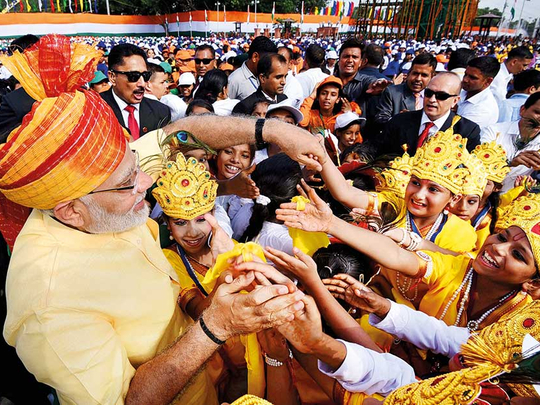
New Delhi: Prime Minister Narendra Modi marked 70 years of Indian independence Tuesday with an impassioned defence of his war on corruption, declaring a controversial move to flush out tax cheats a huge success that netted billions.
In a major address from the ramparts of Delhi’s Red Fort, Modi said his shock decision to devalue India’s largest banknotes had paid dividends, bringing $46 billion in undeclared wealth back into state coffers.
The number of new taxpayers in India more than doubled in the past five months and about Rs3 trillion (Dh172 billion or $47 billion) came back to the banks after the government’s cash ban brought more people into the fold of the formal economy, Prime Minister Narendra Modi said.
“Black money which was hidden was forced to come to the mainstream,” Modi said in his independence day address at the Red Fort in New Delhi. “This is not government research, this is from external experts.”
Vowing to continue the crackdown on unaccounted wealth, Modi said more than 2 trillion rupees has reached banks after the government withdrew high-value currency notes in November, and deposits of 1.75 trillion rupees are under scrutiny. The introduction of the landmark national sales tax on July 1 will further boost transparency, Modi said.
The sudden removal all Rs500 (around $7.50) and Rs1,000 notes from circulation compelled millions to join the formal banking sector for the first time, but triggered a painful cash shortage in the world’s fastest-growing major economy.
Previously, around 90 per cent of everyday transactions in India were in cash.
But Modi, who has stood by the controversial policy even as economists have blamed it for curtailing growth, said trillions of rupees had returned to India under his administration’s crackdown on tax dodgers.
“India is celebrating honesty today. The corrupt have no place to hide anymore,” he said.
More than 300,000 shell companies associated with so-called “black money” had been red-flagged and over 100,000 trading licences revoked under a sweeping clean-out of India’s graft-riddled economy, Modi added.
He used independence day to urge his countrymen to embrace a “New India” where the “poor shall have concrete houses, where farmer income shall double, where youth and women will get ample opportunities”.
“An India which is free of casteism, terrorism, corruption, nepotism. A clean India,” he said.
He also hailed the introduction of a nationwide goods and services tax in July as a success that had doubled the number of new taxpayers this year to 5.6 million — a tiny fraction of India’s 1.3 billion.
New tax filings have more than doubled to 5.6 million between April 1 and August 5, from 2.2 million a year earlier, Modi said. The government has identified 1.8 million people whose assets exceed their known sources of income, and 450,000 of them have come clean and have sought to pay up, he said.
About “100,000 people who had never heard of, or paid, income tax have been forced to do it,” he said.
About 300,000 shell companies — non-trading firms typically used for money laundering and tax evasion — came to light after demonetisation, Modi said. The government has since shut down more than half of them, he said.
“In some cases, there were 400 companies operating from a single address, and there was no inquiry or scrutiny,” Modi said.
Modi, who swept to power in 2014 on promise to eliminate unaccounted cash, can count the currency clampdown and the July 1 launch of an uniform goods and services tax among his biggest policy decisions. While the economy is still recovering from demonetisation, there are signs that the GST has retarded activity in the near term.
The note ban, Modi said, got money into banks, prompting them to cut interest rates. And the GST has reduced time for transporting goods by 30 per cent by eliminating check posts at state borders, he said.












